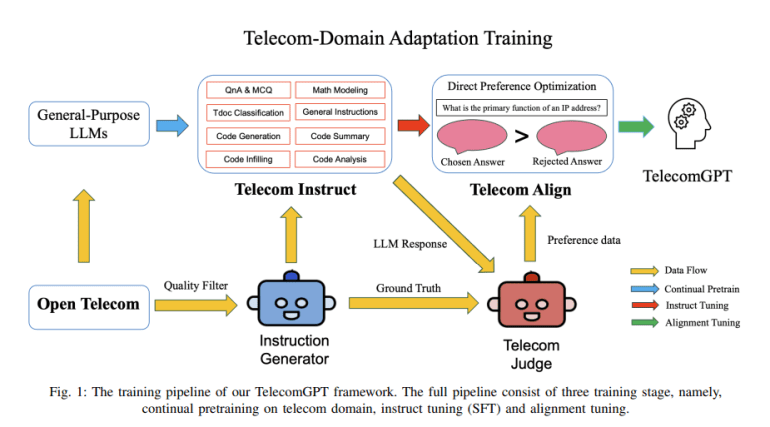- Telecommunications involves technologies like radio, television, satellite, and the internet, essential for global communication and data exchange.
- General-purpose Large Language Models (LLMs) lack the specialized knowledge required for telecom-specific tasks.
- Techniques like model compression and inference acceleration are insufficient for optimizing LLMs for telecom applications.
- TelecomGPT, developed by researchers from the Technology Innovation Institute and Khalifa University, is a telecom-specific LLM.
- TelecomGPT was created using continual pre-training, instruction tuning, and alignment tuning.
- Extensive telecom-specific datasets and new benchmarks were developed for evaluating TelecomGPT.
- TelecomGPT outperformed GPT-4 in several benchmarks: Telecom Math Modeling (81.2% vs. 75.3%), Telecom Open QnA (78.5% vs. 70.1%), and code generation tasks (85.7% vs. 77.4%).
Main AI News:
The telecommunications sector, encompassing technologies like radio, television, satellite, and the internet, is essential for transmitting information over distances, facilitating voice, data, and video communication. This field underpins modern communication, supporting global connectivity and data exchange. Continuous innovations enhance the speed, reliability, and efficiency of communication systems, which are vital for societal and economic operations.
Mainstream Large Language Models (LLMs) lack the specialized knowledge required for telecommunication tasks, creating significant challenges for the industry. Telecom-specific tasks, such as network optimization, protocol development, and complex data analysis, demand precise and advanced models. General-purpose LLMs fail to address these specialized needs, resulting in inefficiencies and limitations in telecom applications.
LLMs like GPT-4, Llama, and Mistral, despite their capabilities in natural language processing, are not optimized for telecom-specific tasks. Techniques such as model compression and inference acceleration adapt these models for various applications, but their performance in the telecom sector remains suboptimal. The lack of telecom-specific datasets and evaluation benchmarks further limits their effectiveness in real-world telecom scenarios.
To address this gap, researchers from the Technology Innovation Institute and Khalifa University developed TelecomGPT, a telecom-specific LLM. They adapted general-purpose LLMs for the telecom domain through continual pre-training, instruction tuning, and alignment tuning. Extensive telecom-specific datasets were constructed, and new benchmarks were proposed to comprehensively evaluate the model’s capabilities, ensuring it handles a wide range of telecom tasks efficiently and accurately.
The development of TelecomGPT involved several critical steps. Researchers collected data from 3GPP technical specifications, IEEE standards, patents, and research papers, ensuring relevance through preprocessing. Continual pre-training enhanced domain-specific knowledge, while instruction tuning improved the model’s ability to follow telecom-specific instructions. Alignment tuning using Direct Preference Optimization (DPO) aligned the model’s responses with user preferences. The framework utilized benchmarks such as Telecom Math Modeling, Telecom Open QnA, and Telecom Code Tasks to evaluate the model’s performance comprehensively, ensuring its efficacy in telecom-specific tasks.
TelecomGPT demonstrated significant performance improvements across several benchmarks. It scored 81.2% in Telecom Math Modeling, surpassing GPT-4’s 75.3%. In the Telecom Open QnA benchmark, TelecomGPT achieved 78.5%, compared to GPT-4’s 70.1%. In code-related tasks, TelecomGPT scored 85.7% in code generation, outperforming GPT-4’s 77.4%. These results highlight TelecomGPT’s enhanced capabilities and effectiveness in handling telecom-specific applications, showcasing its potential to significantly improve efficiency and accuracy in various telecom tasks.
Conclusion:
TelecomGPT represents a significant advancement for the telecommunications industry. By addressing the limitations of general-purpose LLMs and offering specialized capabilities, TelecomGPT can enhance the efficiency and accuracy of telecom-specific tasks. This development is poised to drive innovation, optimize network operations, and improve overall service quality, positioning TelecomGPT as a valuable asset in the competitive telecom market.

